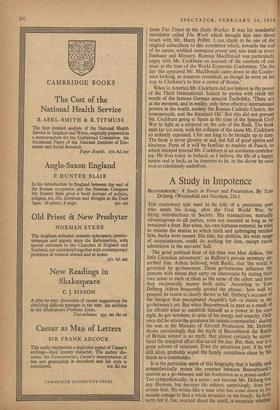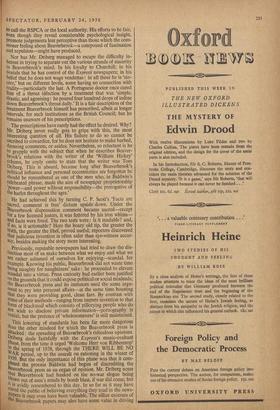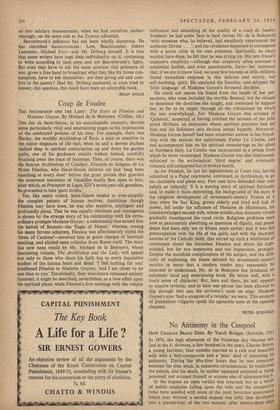A Study in Impotence
BEAVERBROOK : A Study in Power and Frustration. By Toni Driberg. (Weidenfeld and Nicolson, 21s.) THE cautionary tale used to be told of a penurious peer who made his living, after the First World War, by fixing introductions to Society. His transactions, mutually advantageous to all parties, were not resented so long as he remained a fixer. But when, his own fortunes restored, he tried to resume the station to which birth and upbringing entitled him, backs were turned. His title, his abilities, his wide range of acquaintances, could do nothing for him, except excite admiration in the servants' hall.
The great political fixer of his time was Max Aitken, 'the little Canadian adventurer,' as Balfour's private secretary de- scribed him. Aitken believed, with Burke, that 'the world is governed by go-betweens. These go-betweens influence the persons with whom they carry on intercourse by stating their own sense to each of them as the sense of the other; and thus they reciprocally master both sides.' According to Toni Driberg Aitken frequently quoted the phrase : how well Ile grasped its lesson is clearly shown in Mr. Dribcrg's account of the intrigue that precipitated Asquith's fall—a classic in the go-between's art. But when Beaverbrook (a peer as a result of his efforts) tried to establish himself as a power in his own right, he got nowhere, in spite of his energy and tenacity. only once did he attain the greatness his talents commanded : during the war, at the Ministry of Aircraft Production. Mr. Driberg shows convincingly that the myth of Beaverbrook the Battle of Britain winner is no myth; that almost certainly he stimu- lated the marginal effort that saved the day. But, then. war is a great solvent of mistrusts. Even the penurious peer, if he Was still alive, probably wiped the family escutcheon clean by his deeds as a commando.
It is the particular merit of this biography that it lucidly and sympathetically points the contrast between Beaverbrook 's success as a go-between and his frustration as a power-seeker. Too sympathetically, in a sense: not because Mr. Driberg has any illusions, but because the subject. surprisingly, does not arouse him. He writes like a man who has come down to his seaside cottage to find a whale stranded on the beach : he feels sorry for it, but, worried about the smell, is uncertain whether to call the RSPCA or the local authority. His efforts to be fair, even though they reveal considerable psychological insight. promote judgements less perceptive than those which the corn- Moner feeling about Beaverbrook—a compound of fascination and repulsion—might have produced.
Nor has Mr. Driberg managed to escape the difficulty in- herent in trying to separate out the various strands of sincerity in Beaverbrook's mind. In his loyalty to Churchill; in his denials that he has control of the Express newspapers; in his belief that he does not wage vendettas: in all these he is 'sin- cere,' but on different levels, some having no connection with reality—particularly the last. A Portuguese doctor once cured him of a throat infection by a treatment that was 'simple, drastic, and agonising : he poured four hundred drops of iodine down Beaverbrook's throat daily.' It is a fair description of the treatment Beaverbrook himself has prescribed, albeit at longer intervals, for such institutions as the British Council; but he remains unaware of his prescriptions.
The prescriptions have rarely had the effect he desired. Why? Mr. Driberg never really gets to grips with this, the most interesting question of all. His failure to do so cannot he ascribed to cowardice, for he does not hesitate to make barbed, damning comments, or asides. Nevertheless, so reluctant is he to grapple with the subject that when he describes Beaver- brook's relations with the writer of the `William Hickey' Column, he coyly omits to state that the writer was Tom Driberg. This is absurd, because long after Beaverbrook's Political influence and personal eccentricities are forgotten he should be remembered as one of the men who, in Baldwin's `Power—and phrase, made the aim of newspaper proprietorship Power—and power without responsibility—the prerogative of the harlot throughout the ages.'
He had achieved this by turning C. P. Scott's `Facts arc sacred, comment is free' dictum upside down. Under the Beaverbrook dispensation comment became sacred—except for a few licensed jesters, it was fettered by.his iron whims— and were freed. The two tests were: is it readable? and, If so, is it actionable? Here the hoary old tip, the greater the truth, the greater the libel, proved useful; reporters discovered that judicious invention is often safer than eye-witness accur- acy, besides making the story more interesting.
Previously, reputable newspapers had tried to draw the dis- tinction most of us make between what we enjoy and what we are rather ashamed of ourselves for enjoying—scandal, for example. Knowing his public, Beaverbrook did not waste time being naughty for naughtiness' sake: he proceeded to elevate scandal into a virtue. Press curiosity had earlier been justified on the grounds that it could expose political or social misdeeds; the Beaverbrook press and its imitators used the same argu- mei at to pry into personal affairs—at the same time boasting that they were providing good, clean fare. By contrast with SOrne of their methods—ranging from impure invention to that forty of blackmail which consists of pillorying people who do not wish to disclose private information—pornography is venial; but the pretence of 'wholesomeness' is still maintained.
This lowering of standards has been far more dangerous than the other misdeed for which the Beaverbrook press is attacked: the spreading of Beaverbrook's ridiculous opinions. Driberg deals faithfully with the Express's manic-exultant Phase, from the time it urged `Welcome Herr von Ribbentrop' in wilthc spring of 1938, through the THERE WILL BE NO 193M period, up to the assault on rationing in the winter of 9. But the only importance of this phase was that it com- pleted the process Baldwin had begun of discrediting the Beaverbrook press as an organ of opinion. Mr. Driberg notes that Beaverbrook had banked on the no-war slogan being blown out of men's minds by bomb blast, if war did come; but it is avidly remembered to this day. In so far as it may have cured the public of believing everything they read in the news- PaPers it may even have been valuable. The sillier excesses of the Beaverbrook papers may also have some value in driving us into salutary reassessments, when we find ourselves, embar- rassingly, on the same side as the Express editorials.
Beaverbrook's influence has not been wholly disastrous. He has cherished inconsistencies : Low, Beachcomber, Osbert Lancaster, Michael Foot—and Mr. Driberg himself. It is true that some writers have kept their individuality on it, continuing to write according to their own, and not Beaverbrook's, lights. But even they have to ask the same question that prisoners of war, given a free hand to broadcast what they like for home con- sumption, have to ask themselves : are they giving aid and com- fort to the enemy? Had Mr. Driberg answered, or even tried to answer, this question, this could have been an admirable book.
BRIAN INGLIS




































 Previous page
Previous page